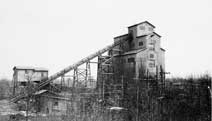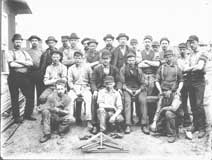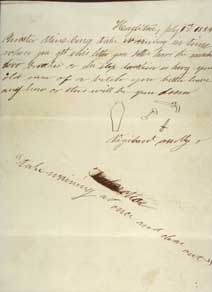 |
 |
|
The Coxe family’s connection to Pennsylvania’s anthracite coal industry reflects the foresight of statesman and family founder, Tench Coxe. Recognizing very early the significance of anthracite coal for the development of the new Republic, Coxe purchased nearly 80,000 acres of Pennsylvania land marked by anthracite outcroppings. He hoped his descendants would profit from the land when anthracite came of age, and indeed it was this purchase that would secure the Coxe family and all their future enterprises well into the twentieth century. Tench Coxe himself died before the family’s anthracite holdings were put to use. But in January 1865, his grandchildren Eckley, Alex, Henry, Charles & Franklin leased the Drifton Property from their grandfather’s estate and formed Coxe Brothers and Company. Coxe Brothers succeeded beyond their expectations, opening new collieries in rapid succession. Other siblings and cousins soon joined the effort, forming a new company called the Cross Creek Coal Company in 1882. Cross Creek took over the Coxe Brother’s mining operations, and continued to process its coal at Coxe Brother’s collieries. . Profits in anthracite mining depended in these early years on securing favorable shipping rates from the railroads. But because railroads also mined coal on their own lands, railroad owners generally charged inflated shipping fees to independent mining operations, forcing companies like Cross Creek to charge higher wholesale prices for their coal. Eckley Coxe attacked the power of the railroads by arguing successfully that their pricing practices violated the rules of the Interstate Commerce Commission. But, having “beat ‘em,” the Coxe family also decided to “join ‘em,” creating the Delaware, Susquehanna & Schuylkill Railroad in 1891, a move that ultimately assured their position as the largest indpendent anthracite producer in Pennsylvania. |
The Coxe family continued to proliferate corporations and concerns in the region. Eckley B. Coxe, Jr., great grandson of Tench Coxe, and Ezra B. Ely were made partners in the Cross Creek firm in June 1893, just weeks prior to the organization of two more Coxe-owned companies. Coxe Brothers and Company, Inc., which was organized as a selling agency, had offices in Buffalo, New York, Chicago, Milwaukee and Philadelphia. Coxe Iron Manufacturing Company, incorporated the same day, took control of the machine shops that built and repaired mining and railroad equipment. In March 1900, the stock of both companies was transferred to the Cross Creek Coal Co., which adopted the name of Coxe Brothers & Company, Inc. In 1905, the company was successfully wooed by the land-hungry Lehigh Valley Railroad. The family sold the capital stock of Coxe Brothers & Co., Inc. to the Railroad for $18.4 million, ending all family interests in the company. But the gigantic company was too big for the Interstate Commerce Commission to accept, and the Railroad was found in violation of Federal Anti-Trust Laws & the Commodities Clause of the Interstate Commerce Act. In 1923 the District Court of the United States assigned the full voting power of Coxe Brothers’ stock to a government trustee, who was ordered not to vote in any way that would “bring about a unity of interest [between the two companies] or suppression of competition.” This trusteeship would continue for twenty years, during which time Coxe Brothers & Co., Inc. would enter into a series of agreements and sub-leases on their land holdings. After a series of lawsuits between the Estate of Tench Coxe and Coxe Brothers over management of the property, both sides agreed on 27 July 1950 to cancel the 1904 lease, thus putting Coxe Brothers & Co., Inc. out of business and setting the stage for its formal dissolution. |


